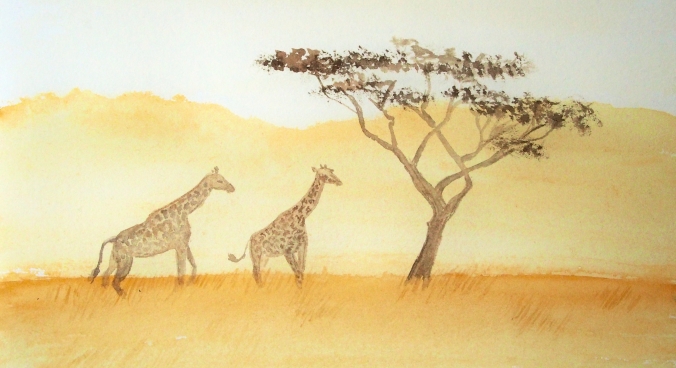
I read Karen Blixen’s Out of Africa (1937) and imagined myself walking among the coffee plants at the foot of Ngong Hills. I’ve never been to Kenya so I have to imagine a lot, especially because Karen Blixen’s world is already a hundred years old.
Out of Africa is an insightful piece of literature, a window to the early 20th century British East Africa, now known as Kenya. It is not a love story like the film, Blixen hardly writes about her love affair, instead, she writes about the country and the culture, and the way they are coping with the changes. Indeed, many things were changing, especially for native people.
The way Blixen writes about the Natives (as they are called in my edition) is often troubling. Blixen has been accused of racism although other scholars argue that, in fact, she was rather progressive. Oftentimes she speaks of the people who live on her farm like they’d represent different species, yet she is very compassionate and seems to have meaningful relationships with them.
Despite the sometimes uncomfortable notions about the locals, Blixen captures great moments bringing the farm and the people on it alive. I am especially fond of the incidents concerning the Natives and the written word, which was a fairly new concept to them at the time.
Blixen writes about mesmerised houseboys who stood and watched her while she typed away on her typewriter. She explains how the letters were like magical messages to the Native people who brought their letters for her to read as they themselves did not know how to read. The Natives would ask Blixen to read the same letters or pieces of documents over and over again.
“The past that had been so difficult to bring to memory — had been caught, conquered, and pinned down before his eyes. It had become history; with it there was now no variableness neither shadow of turning.”
To Blixen these letters seem clumsy and confusing. Especially so because the meaning was often lost in the process of translation by the letter-writers to whom the sender of the letter dictated the message.
“From all these efforts come the sort of messages that people got from the Oracle of Delphi — you feel that there is some vital communication which has been heavy on the heart of the sender — but it is wrapped up in darkness.”
Blixen is simultaneously amused and impatient with the illiterate Natives. She tries to teach poetry and verse to children, to teach them to “speak like rain”, but gives up saying that the Natives “know nothing of verse”. Perhaps she finds it difficult to relate to a life where there is no room for education and literature. However, the Native’s new relationship with the written word is a good example of the changes that were taking place in Kenya.
I do not think we need censorship on literature that represents colonial times. Changing the lines on a book is not going to change the past which should not be glorified nor erased. Out of Africa is a memoir of a white coffee-plantation owner who drinks champagne on the veranda while local (working) children tiptoe to her house to adore a German cuckoo-clock. It is her view of the world. Hopefully, we view the world and read these books differently today.
References:
Wolfson, L. 1998. Blixen, Karen (Isak Dinesen). Postcolonial Studies @ Emory. Viewed 2 Aug 2020. Available at https://scholarblogs.emory.edu/postcolonialstudies/2014/06/10/207/
Kjældgaard, L.H., 2019. Death from Torture as a Thing of Beauty? Karen Blixen and Kitosch’s Story. Scandinavian Studies, 91(3), pp.345-370. Available at https://www.jstor.org/stable/pdf/10.5406/scanstud.91.3.0345.pdf
Stockmann, C. 2014. ‘Two versions of and international figure’. Politiken. 2 September 2014. Available at https://scandinavian.washington.edu/file/1051/download?token=E1Faa_TF
Politiken. 2014. ‘Literary scholar: “Of course Blixen was a racist”’. Politiken. 6 September 2014. Available at https://scandinavian.washington.edu/file/1051/download?token=E1Faa_TF
I found the book an interesting read.i have been to Kenya and visited her home which is now a sort of museum. Our guide spoke of her fondly as if she was only recently there. I also saw the film with Robert Redford and Meryl Streep which I also liked.
LikeLike
It would be very interesting to visit the house! Maybe one day
LikeLiked by 1 person